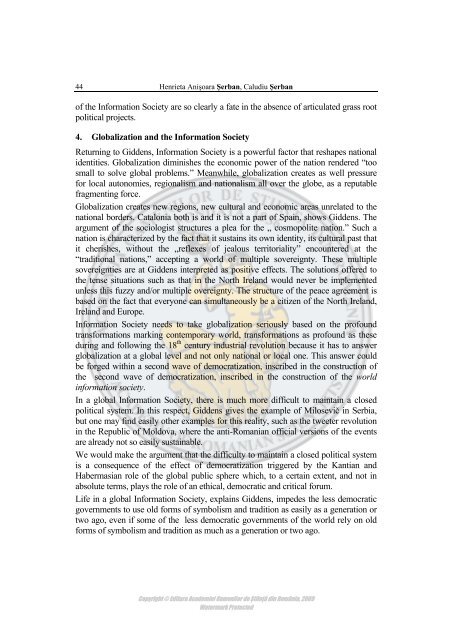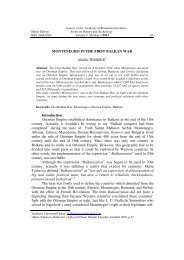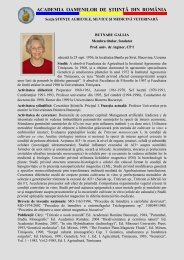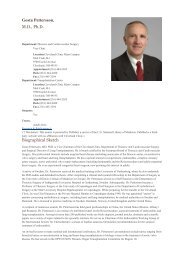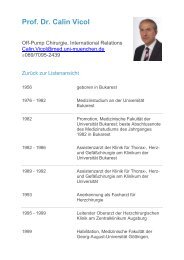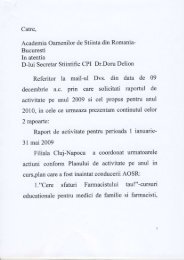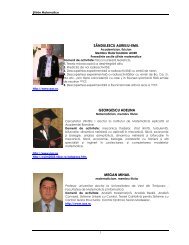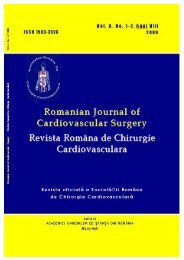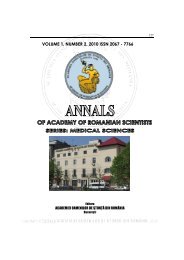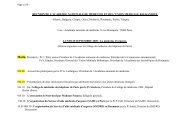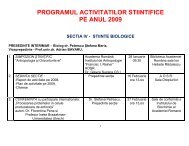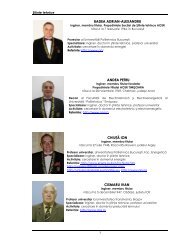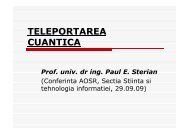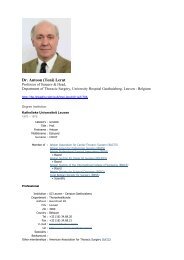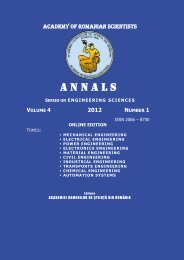PROCEEDINGS - Academia Oamenilor de Stiinta din Romania
PROCEEDINGS - Academia Oamenilor de Stiinta din Romania
PROCEEDINGS - Academia Oamenilor de Stiinta din Romania
Create successful ePaper yourself
Turn your PDF publications into a flip-book with our unique Google optimized e-Paper software.
44 Henrieta Anişoara Şerban, Caludiu Şerban<br />
of the Information Society are so clearly a fate in the absence of articulated grass root<br />
political projects.<br />
4. Globalization and the Information Society<br />
Returning to Gid<strong>de</strong>ns, Information Society is a powerful factor that reshapes national<br />
i<strong>de</strong>ntities. Globalization diminishes the economic power of the nation ren<strong>de</strong>red “too<br />
small to solve global problems.” Meanwhile, globalization creates as well pressure<br />
for local autonomies, regionalism and nationalism all over the globe, as a reputable<br />
fragmenting force.<br />
Globalization creates new regions, new cultural and economic areas unrelated to the<br />
national bor<strong>de</strong>rs. Catalonia both is and it is not a part of Spain, shows Gid<strong>de</strong>ns. The<br />
argument of the sociologist structures a plea for the „ cosmopolite nation.” Such a<br />
nation is characterized by the fact that it sustains its own i<strong>de</strong>ntity, its cultural past that<br />
it cherishes, without the „reflexes of jealous territoriality” encountered at the<br />
“traditional nations,” accepting a world of multiple sovereignty. These multiple<br />
sovereignties are at Gid<strong>de</strong>ns interpreted as positive effects. The solutions offered to<br />
the tense situations such as that in the North Ireland would never be implemented<br />
unless this fuzzy and/or multiple overeignty. The structure of the peace agreement is<br />
based on the fact that everyone can simultaneously be a citizen of the North Ireland,<br />
Ireland and Europe.<br />
Information Society needs to take globalization seriously based on the profound<br />
transformations marking contemporary world, transformations as profound as these<br />
during and following the 18 th century industrial revolution because it has to answer<br />
globalization at a global level and not only national or local one. This answer could<br />
be forged within a second wave of <strong>de</strong>mocratization, inscribed in the construction of<br />
the second wave of <strong>de</strong>mocratization, inscribed in the construction of the world<br />
information society.<br />
In a global Information Society, there is much more difficult to maintain a closed<br />
political system. In this respect, Gid<strong>de</strong>ns gives the example of Milosevič in Serbia,<br />
but one may find easily other examples for this reality, such as the tweeter revolution<br />
in the Republic of Moldova, where the anti-<strong>Romania</strong>n official versions of the events<br />
are already not so easily sustainable.<br />
We would make the argument that the difficulty to maintain a closed political system<br />
is a consequence of the effect of <strong>de</strong>mocratization triggered by the Kantian and<br />
Habermasian role of the global public sphere which, to a certain extent, and not in<br />
absolute terms, plays the role of an ethical, <strong>de</strong>mocratic and critical forum.<br />
Life in a global Information Society, explains Gid<strong>de</strong>ns, impe<strong>de</strong>s the less <strong>de</strong>mocratic<br />
governments to use old forms of symbolism and tradition as easily as a generation or<br />
two ago, even if some of the less <strong>de</strong>mocratic governments of the world rely on old<br />
forms of symbolism and tradition as much as a generation or two ago.<br />
Copyright © Editura Aca<strong>de</strong>miei <strong>Oamenilor</strong> <strong>de</strong> Știință <strong>din</strong> România, 2009<br />
Watermark Protected


